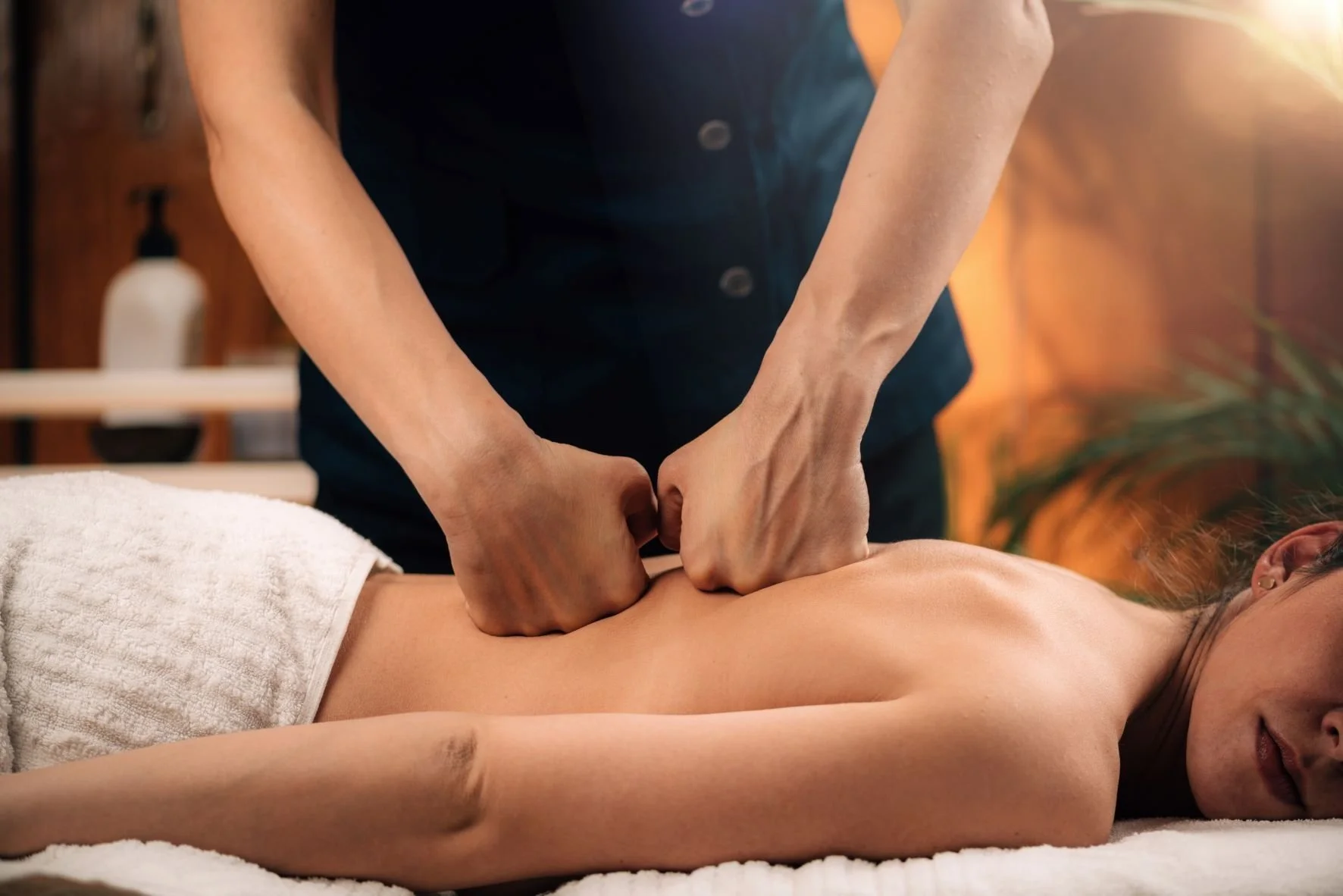Bruising After Deep Tissue Massage: Is It Normal?
Finding time for yourself especially for something as “indulgent” as a massage feels nearly impossible. And when you finally carve out that time, book a deep tissue massage, and walk away sore or even bruised after your massage, you start to wonder: “Was this supposed to happen?”
A deep tissue massage is a great way to relieve tension from both your muscles and their surrounding connective tissues, speeding up recovery time for an injury or simply leaving you feeling rejuvenated and more flexible.
Unlike a traditional Swedish massage, which is performed using gentle, long strokes, a deep tissue massage is performed with pressure, and can be used to target just one area of the body.
When getting a deep tissue massage for the first time, you might experience some discomfort and tenderness in the treated area, and this is totally normal. For some, bruising is a surprise and less common side-effect of a deep tissue massage. But is it normal?
In this blog, we're going to take a look at some reasons why you might notice bruising after a deep tissue massage, and what you should do if you experience this after your treatment. But first, let us look into why you shouldn’t ignore some body signs before and after a massage.
Why You Shouldn’t Ignore What Your Body Is Telling You
Neglecting your physical and mental wellbeing is a bad bad habit than can snowball into chronic tension, irritability, poor sleep, and even burnout. The “I'll rest later” mindset comes at a cost.
Many professionals today accept constant neck tightness, shoulder knots, or back pain as part of the hustle. But when left unaddressed, tension compounds and eventually, your body starts talking back. That’s why understanding the effects (and side effects) of treatments like deep tissue massage matters.
What is a deep tissue massage?
A deep tissue massage is a type of massage therapy that aims to relieve deep tension in the body, and does so by removing any muscle knots around the deep layers of the muscles and their surrounding connective tissues.
Deep tissue massages can work to reduce inflammation, chronic pain, and discomfort, and are very popular amongst athletes and runners.
A deep tissue massage is slightly more intense than a traditional Swedish massage, and can cause some degree of discomfort, especially if it's your first time getting this type of treatment. You can minimize discomfort by maintaining open communication with your massage therapist during treatment, and discussing any concerns beforehand.
What You Can Expect from Deep Tissue Massage (Long-Term Benefits)
While the occasional bruise might be inconvenient, the long-term benefits of deep tissue massage far outweigh short-term side effects. The therapy enhances blood flow, breaks down scar tissue, improves flexibility, and promotes mental relaxation.
A 2024 systematic review of 84 studies published in the Annals of Palliative Medicine found that massage therapy, including deep tissue techniques, was associated with moderate-certainty evidence for reducing pain and improving function in conditions such as chronic low back pain and shoulder pain.
Deep tissue massage supports:
Improved posture and alignment
Reduced tension headaches
Better athletic recovery
Enhanced sleep quality
Lowered stress hormones (cortisol)
To maintain results, schedule sessions every 4–6 weeks and communicate openly with your therapist about your body’s response.
Bruising After Deep Tissue Massage
Many people book a deep tissue massage to relieve chronic tension, soreness, or post-workout stiffness. But few expect to walk away with small bruises or tender spots. So what exactly should you expect from deep tissue massage?
A deep tissue massage involves slow, firm pressure applied to the deeper layers of muscle and fascia. According to the National Center for Complementary and Integrative Health (NCCIH), this form of massage can help improve blood circulation, release adhesions, and enhance flexibility. However, because it targets deep tissues, it may cause mild inflammation and tiny capillary breaks beneath the skin — leading to temporary bruising.
“Bruising after deep tissue work is usually the body’s way of processing released tension,” explains Dr. Janet Harris, DPT, a licensed physical therapist. “The key is distinguishing between normal post-massage tenderness and injury-level pain.”
If you’re new to this treatment, expect mild soreness or color changes that fade within a few days. Communicate with your therapist if the pressure feels too intense — professional massage therapy should relieve pain, not cause it. Always drink water afterward to support lymphatic drainage and healing.
Is bruising after a deep tissue massage normal?
It's first important to note that noticing bruises after a deep tissue massage is rarely a cause for concern, and isn't usually indicative of any underlying health conditions.
In most cases, bruising occurs when a build-up of lymphatic fluid in the treated area is released during the massage, causing mild bruising under the surface of the skin. While the bruise may appear unsightly, the removal of these knots is actually one of the key purposes of a deep tissue massage - you'll notice reduced tension in the area and enhanced flexibility.
Bruising can also occur if you take certain medications, or if your therapist is using improper techniques when performing the deep tissue massage. Let's explore these two explanations further.
So What Causes Bruises after a Massage?
When your therapist works on deeper layers of muscle, they’re also stimulating your body’s lymphatic system. That can release trapped fluids and tension. The result sometimes causes mild bruising under the skin, especially in sensitive areas like the back or thighs.
You might feel:
Tenderness after massage
Slight swelling
A bruise from massage (mild and temporary)
This is typically just your body processing the effects of a powerful, healing treatment.
What Else Causes Bruising during a Deep Tissue Massage?
Poor technique
As mentioned above, a deep tissue massage isn't the same as a traditional Swedish massage, and the techniques used during this treatment are more complex and require separate training. If your massage was performed by an amateur therapist who hasn't been sufficiently trained in deep tissue techniques, this can result in bruising.
To avoid this, always make sure to hire a professional and licensed massage therapist, especially when opting for a deep tissue treatment. At Spa Theory, all of our massage therapists are vetted, licensed, and insured for your safety.
Medications
If you're currently taking blood-thinners or other medications that reduce blood clotting, you may be more prone to bruising during deep tissue massage. You can let your massage therapist know about this beforehand, so they'll be able to adjust their techniques where possible to help avoid bruising or help minimize discomfort.
Genetics
Some of us bruise like a peach - and there's not much we can do about it! If you're prone to bruising after bumps and scrapes, you may find that a deep tissue massage - especially if it's your first one - can result in some light bruising here and there. As your body gets used to the treatment, the appearance of these bruises should reduce over time.
When Should You Worry About a Massage Bruise?
Most deep tissue massage bruising is nothing to stress about. However, be on alert if:
You have bruises from massage after every session (even gentler styles like Swedish massage)
You notice broken capillaries or significant pain
Bruising occurs without any physical trauma in daily life
If you're noticing a general increase in bruising in your day-to-day life (not just after a massage) this could also be your cue to head to your doctor's office for a quick check-up and blood test. While it's most likely nothing serious (bruising can often simply indicate a vitamin deficiency) it'll give you some peace of mind going forward.
Pro tip: When searching for “massage near me” or “massage deep tissue near me,” be sure the provider has stellar credentials and reviews. At Spa Theory, your safety and satisfaction are our top priorities.
How to Treat Bruising After Massage
If you notice a bruise from deep tissue massage, here are some quick tips:
Apply a cold compress within the first 24 hours
Keep the area elevated if possible
Use natural anti-inflammatories like arnica or turmeric
Stay hydrated to support recovery
Avoid intense physical activity for 24–48 hours
Most bruises fade within a few days to a week. If it lingers or worsens, seek medical advice.
Still Wondering: Is Deep Tissue Massage Worth It?
Absolutely. While some soreness after massage is normal, the benefits of deep tissue massage therapy include:
Improved circulation
Reduced stress
Better sleep
Muscle recovery
Long-term pain relief
Whether you're dealing with back bruised after massage, deep tissue pain massage, or just want a reset, Spa Theory makes it effortless to prioritize your health.
How to Find a Professional Mobile Massage Therapist in Atlanta
If you're looking for a licensed, professional, mobile massage therapist, look no further than Spa Theory. Whether you're looking for a deep tissue massage, a traditional Swedish massage, or a professional mobile couples massage in Atlanta, our professional network of spa therapists can bring their skills to you. Who wouldn’t love a professional massage in the comfort of their own home? Get in touch today, or take a look at our booking page for more information.
Taking care of yourself isn’t selfish. It’s smart.
You don’t need to push through burnout or wait for a breakdown to invest in wellness. Whether it’s a Thai massage, sports massage, or a simple Swedish massage, relief should be part of your routine — not a rare treat.
Start Your Self-Care Routine with a Spa Membership That Works Around You
At Spa Theory, we believe your wellness should be flexible, beautiful, and yours.
For just $119/month, you can enjoy one premium spa service monthly, either massage, facial, or beauty, with credits that roll over and never expire.
➡️ Join the $119/month Spa Theory Membership
FAQs
How do you get rid of deep tissue bruises?
Use cold compresses, rest, and natural remedies like arnica. Most fade within 3–7 days.
How long do deep tissue bruises last?
Typically under a week. If longer, consult a healthcare provider.
Am I supposed to bruise after a deep tissue massage?
Mild bruising can occur, especially with high pressure or sensitive skin. It’s not always common, but not usually a red flag.
What’s the fastest way to heal a massage bruise?
Cold therapy, hydration, rest, and avoiding pressure on the area.

